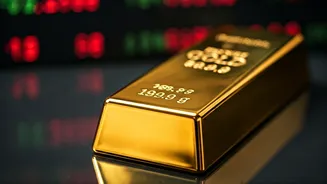Safe Haven Appeal
Gold's enduring appeal as a safe-haven asset is a significant factor in its current high valuation. In times of economic instability, geopolitical tensions,
or market volatility, investors often turn to gold as a means of preserving wealth. Its historical performance during crises has cemented its reputation. This inherent safe-haven status leads to increased demand and upward pressure on prices, as investors seek to protect their portfolios from potential losses. Various global uncertainties, including inflationary pressures and concerns about economic growth, are currently contributing to the heightened demand for gold, making it a desirable asset to hold. The perception that gold acts as a hedge against risks makes it a popular choice, particularly when other investment options appear less secure.
US Rate-Cut Bets
Another key driver for gold's price surge is speculation about potential interest rate cuts by the US Federal Reserve. Lower interest rates generally reduce the opportunity cost of holding non-yielding assets like gold, which means investors are more inclined to buy and hold it. When interest rates are low, gold becomes more attractive relative to interest-bearing assets, and this can lead to an increase in gold demand. Traders and investors closely monitor economic data and statements from the Federal Reserve to gauge the likelihood and timing of rate cuts. Expectations of lower rates also tend to weaken the US dollar, making gold more affordable for buyers holding other currencies, thereby further supporting its price. If the Fed does decide to reduce rates, this could provide an additional boost to gold prices.
Market Dynamics at Play
The interplay of multiple market forces contributes to gold's price movements. Currency fluctuations, particularly those of the US dollar, have a considerable impact. A weaker dollar can increase gold prices, as gold becomes cheaper for holders of other currencies. Conversely, a stronger dollar can put downward pressure on gold. Inflation expectations also influence gold prices; investors often turn to gold as a hedge against inflation. If inflation is expected to rise, demand for gold tends to increase. Supply and demand dynamics within the gold market itself further affect prices. Changes in gold production, consumer demand, and investment demand from institutional and retail investors all have an impact. The combination of these factors creates a complex environment where gold prices are constantly adjusting based on market sentiment and economic indicators. Understanding these dynamics is essential for interpreting gold's current valuation and predicting future trends.
Global Economic Climate
The broader global economic climate also significantly influences gold's performance. Economic downturns or recessions often lead investors to seek safe-haven assets, including gold. Uncertainty about global growth, trade disputes, and geopolitical events can all fuel demand for gold. Investors’ perceptions of economic risks influence their investment decisions, and gold tends to be seen as a reliable asset during periods of financial stress. In some developing economies, gold also plays a crucial role as a store of value due to its relative stability compared to local currencies or assets that are exposed to domestic market volatility. Overall, the interplay of economic risks and global events creates a dynamic environment that drives gold prices.
Implications for Investors
For investors, the current environment presents both opportunities and risks. The rising price of gold can offer potential gains, but it's important to understand the factors driving its price. Gold is often a component of a diversified portfolio, as it can help reduce overall portfolio risk. However, investors need to be aware of the inherent volatility in the market and that factors driving gold prices can change quickly. They must also consider factors like inflation, the Federal Reserve's policy, and global economic trends to make informed decisions. Diversification, careful risk assessment, and informed investment choices are thus crucial for navigating the gold market successfully. The use of financial advisors also plays a role in helping investors make informed decisions about their gold investments.













